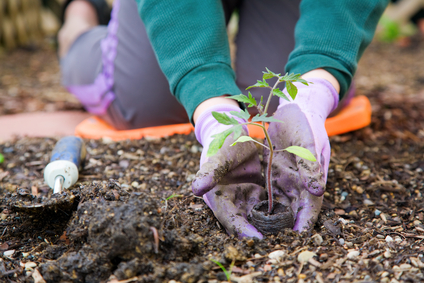|
In the last few decades, dozens of pesticides have been taken off the market. Chlordane, a key ingredient of many popular household pesticides, was taken off the market in 1988, after scientists found out it's harmful to humans as well as bugs. Organophosphates replaced chlordane when it was removed from the market; these chemicals were used often to rid wood homes of termites. It was discontinued in 1992, when scientists discovered that it can break down more rapidly in some soil types, causing it to be dangerous to plants and people, as well as insects. Researchers are still on the lookout for chemicals that are both effective and safe for use in the garden. Unarguably, the safest types of pesticides available are brand name green options or homemade versions using essential oils and other completely safe household ingredients. Brand Name OptionsMany companies that have traditionally offered strong chemical pesticides are now marketing "green" versions. For a pesticide to be labeled "green," it must be produced from organic sources. Many are made from products derived from natural plants. Some green pesticides are made from onion, chive, garlic or tobacco extracts, all with strong bug-resisting properties and without chemicals that could harm you, your pets or the environment. At Home OptionsHomemade pesticides can be just as effective as their mass-produced counterparts. But homemade versions of commercially-developed pesticides tend to cost much less. With a little research and know-how, you can also make just the pesticide you need to get rid of the pests in your own backyard—without spraying poisonous chemicals, and harm even the beneficial organisms and bacteria on your plants and soil. Plants that Resist InsectsBy planting key plants around your garden area, you could repel pests naturally. Researchers at Swansea University found that the green muscardine fungus can actually repel some insects while leaving other insects and plants undamaged, according to the Natural Environment Research Council. It's also common knowledge that plants like peppermint and marigolds help resist bugs, because insects are repelled by the scent these plants produce. Making your own Homemade PesticidesOnce you've pinpointed the types of insects you're having trouble with—whether they're bed bugs, termites or beetles on your tomato plants—you can craft the right pesticide to get rid of them, often using just essential oils and household ingredients. According to the experts at Sensible Gardener and Landscaper, herbs and products like nettles, neem oil, tansy, and rhubarb leaves all make effective pest repellants, depending on the type of pests you're trying to get rid of. If you opt for the homemade pesticide option, make sure you follow the recipes exactly. If you don't get the mixes right, you could end up causing damage to the plant or to other healthy organisms your garden needs to thrive. Organic, homemade pesticides can can be an effective alternative to store-bought chemical alternatives; just take the time to do your research first.
2 Comments
|


 RSS Feed
RSS Feed
